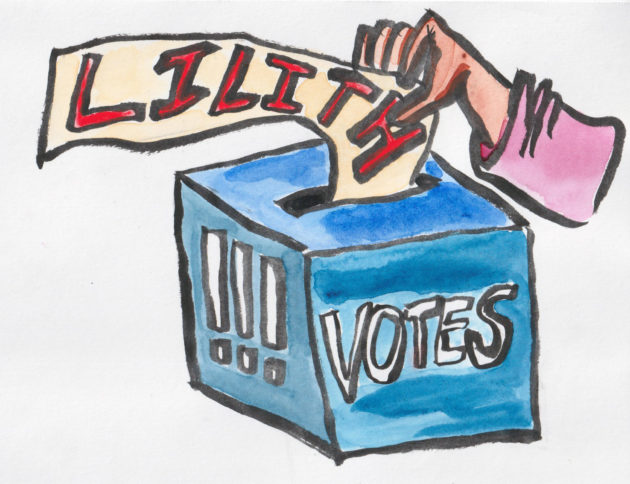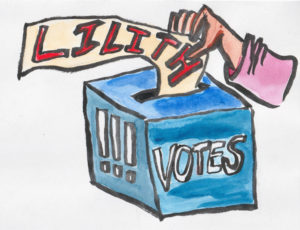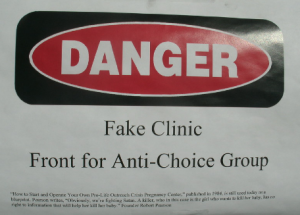Author Archives: Arielle Silver-Willner
January 7, 2021 by Arielle Silver-Willner
A Little Backyard Writing School

It’s Friday afternoon and I am in my backyard, setting out plastic cushions six feet apart, disinfecting pencils, and copying my lesson plan onto a dry erase board with multi-colored markers. It’s starting to get cold, but I’m armed with a case of hand warmers and a list of activities that will keep my students moving.
I’m ready for winter.
- No Comments
September 11, 2020 by Arielle Silver-Willner
Lilith Votes: The Truth about Voter Suppression

During my first year of college, I registered to vote at a picnic table in front of the Student Center. The student running the event, a volunteer for the Bernie Sanders campaign, shared my excitement about voting in our first-ever election for a candidate that we “actually liked.” I filled out the registration form carefully, verified that I would be 18 before the 2016 Democratic primary, and slipped the paper into an official-looking box.
I grew up in New York, but had decided to register locally in Connecticut so that I could vote in person. I envisioned myself as a “civically engaged youth,” doing my part to push our country further toward justice.
- No Comments
September 9, 2020 by Arielle Silver-Willner
Lilith Votes: How to Make a Voting Plan, Today!

November is quickly approaching, and with it, so is the possibility of another surge of the Coronavirus. In preparation for this critical election, it is important to make a plan for how you will cast your vote. Whether this election will be your first or your fifteenth, use this guide to find all the information you’ll need to safely and successfully cast your ballot.
- No Comments
July 30, 2020 by Arielle Silver-Willner
Twinkle Times Two: On Vigilance and Anxiety
“Take your shoes off,” I remind my mother. “Drop your keys; I’ll clean them.” “Wash your hands and get changed. Wait, no—take off your street clothes first, then wash your hands. But don’t touch anything else.” She comes inside. I cringe as she sets her sunglasses down on the kitchen counter, making a mental note to sanitize them when she isn’t looking, and give the counter a scrub too, of course. I follow her to her bedroom, watching her undress, confirming that her shorts and t-shirt make it into the laundry bag.
Will it be enough? Is it too much?
- No Comments
June 25, 2020 by Arielle Silver-Willner
“We’re All Nervous About What’s Coming”—A Michigan Nurse on the Covid Crisis
Melissa Boals is a nurse at Munson Medical Center in Traverse City, Michigan. She serves on the board of the Michigan Nurses Association, which represents approximately 13,000 nurses, and her hospital recently won its fight for unionization in 2017. In early May, she spoke to Arielle Silver-Willner about her experiences during the Covid crisis, as well as Jewish identity in the predominantly non-Jewish Traverse City.
Arielle Silver-Willner: I’d like to begin by thanking you for your hard work, bravery, and the sacrifices you’ve had to make during the last few months (I heard that you had to be separated from your daughter for safety reasons and that today is the first time you are able to see her again). All of this could not have been easy—how are you?
Melissa Boals: I’m happy right now. When I picked her up I teared up. I know that I only have so many days with her and then we’ll see what happens because we’re having a lot of tourists coming, not social distancing and not wearing masks and it’s very concerning. According to the Grand Traverse Health Department website we had two out-of-state travelers test positive. Both were symptomatic. They had traveled to Grand Traverse County to visit family, so we’re all nervous about what’s coming.
- No Comments
June 15, 2020 by Arielle Silver-Willner
From Catholic to Conservative Jew: One Spiritual Journey
Dennies Gajadhar was born and raised in a Catholic family in Guyana. Soon after moving to the U.S., she began to learn about Judaism and made the decision to convert, become a Bat Mitzvah, and move to an Orthodox community. She spoke with Arielle Silver-Willner about her journey, and her experiences as a newcomer and a black woman in the Orthodox community.
Arielle Silver-Willner: You were born into a Caribbean Catholic family- How did you learn about Jewish traditions and practices?
Dennies Gajadhar: Where we are from, we’d never heard about Judaism. When I came here I started working [as a nanny]. My job was to take [the children] to Hebrew school and then they joined the choir; I would stay and listen to them. At one point they were singing and I was singing too, and the cantor was like “Maybe you should join the choir.”
- No Comments
April 24, 2020 by Arielle Silver-Willner
A Nanny Reflects on the Pandemic and the U.S. Labor System
It’s a Tuesday afternoon and I am sitting on the couch, in my PJs. I should be walking to the elementary school; pick-up is at 2:40. But everything is different now.
I work part-time as a nanny, and like many of the jobs that comprise the so-called “gig economy” and the domestic workforce, the Coronavirus pandemic has brought my work to a screeching halt.
- No Comments
February 27, 2020 by Arielle Silver-Willner
I Wasn’t Ready for My Bat Mitzvah at 13.

My Bat Mitzvah was a hit. After the service, I was approached by relatives, friends, and congregation members wishing me mazel tov and telling me what a great job I had done. So poised! So insightful! So well-spoken! But here’s the thing—I wasn’t.
I should mention that I had an untraditional bat mitzvah—my family belonged to a Humanistic Jewish congregation that aims to celebrate Jewish traditions, history, and values. The “cantor” adapts many of the old classics to focus on peace and love instead of god. The congregation doesn’t even own a Torah. And for this, I am grateful; it was wonderful to be part of the Jewish community in a way that was consistent with my family’s varying degrees of atheism.
- No Comments
January 7, 2020 by Arielle Silver-Willner
The Fake Abortion Clinics That Mislead Patients

You’re well aware of the dire state of reproductive justice in the United States. You know that recent legislative moves such as the so-called “Heartbeat Bills” and the reduction of funding for Planned Parenthood severely threaten the lives of all folks capable of pregnancy or experiencing health conditions that affect the female reproductive system.
But there’s another threat to reproductive justice which works in tandem with these laws. Because even as abortion access gets choked by a million restrictions, Crisis Pregnancy Centers proliferate.
CPCs, also known as “fake abortion clinics” or, euphemistically, “Pregnancy Resource Centers” are essentially anti-choice hubs of misinformation. Often located in close proximity to an abortion-providing women’s health center such as Planned Parenthood, they aim to reach pregnant, option-seeking people before they make the choice to terminate. Many are religiously affiliated. However, as nonprofit organizations, they are also eligible to receive Title X funding.
In New York City, CPCs must adhere to legal guidelines intended to ensure that visitors are aware that they are not entering an abortion clinic, or even a medical center. New York City Local Law 17 requires these offices to display disclosure statements in both English and Spanish, advising visitors that they do not employ licensed medical professionals, and thus conveying that they will be receiving social services, but not medical services. However, Centers outside of NYC are entirely unregulated, as they are not technically medical centers or businesses. Even so, they can and do interfere with the health of their “patients.”
- 1 Comment
August 30, 2019 by Arielle Silver-Willner
Does Judaism Permit Abortion? Depends Who You Ask.
By Arielle Silver-Willner
Recent threats to abortion access in the U.S. have provoked national discourse regarding reproductive justice–What does it mean? Whom does it affect? How can it be implemented? These questions have extended to Jewish communities, and create the opportunity for lively, comprehensive discussions.
Addressing both Jewish tradition and the current sociopolitical climate, the Jewish Orthodox Feminist Alliance (JOFA) hosted a panel this July in Manhattan to address these questions among others. In Orthodox communities, the subject of reproduction is often governed by the halachic law, which instructs Jews to “be fruitful and multiply.” Thus, contraception and abortion are somewhat contentious subjects. However, the JOFA panelists– professor of Judaic Studies Dr. Elana Stein Hain, lawyer Gail Katz, and ObGyn Dr. Susan Lobel– seemed to agree that, at the very least, safe and legal abortion should be available if the pregnant person’s life is at risk. Stein Hain explained that Jewish texts declare the pregnant woman’s life “takes precedence over the life of the fetus.” Thus, clearly, Judaism does accept the termination of a pregnancy in certain circumstances. What these circumstances are, however, is less clear. Laughing, Stein Hain noted, “in true Jewish fashion, [it] depends who you ask.”
- No Comments
 Please wait...
Please wait...